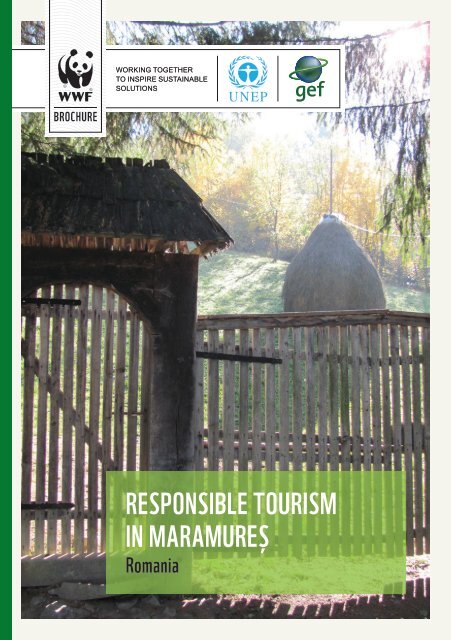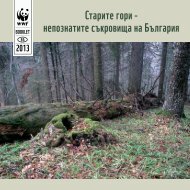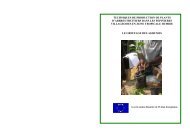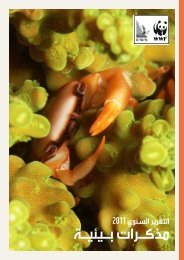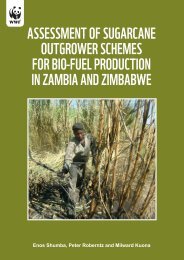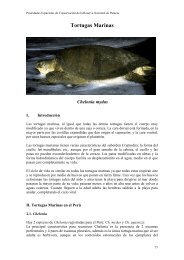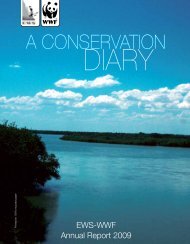Maramures-EN v2 - WWF
Maramures-EN v2 - WWF
Maramures-EN v2 - WWF
You also want an ePaper? Increase the reach of your titles
YUMPU automatically turns print PDFs into web optimized ePapers that Google loves.
Text: Monia Martini, Mara CazacuGraphic design: Florin Tarța (Ecuson Studio)Front cover photo: ©Mara CazacuPublished in June 2013 by <strong>WWF</strong>-Romania. Any reproduction in full or in partmust mention the title and credit the above-mentioned publisher as the copyright owner.©2013 <strong>WWF</strong>-RomaniaAll rights reserved.<strong>WWF</strong>-Romania26A Ioan Caragea Voda Street, 010537, District 1, BucharestTel. 021 317 49 96, Fax 021 317 49 97office@wwfdcp.ro, www.wwf.rowww.panda.org/dcpo - The Danube PES Project
Ecosystem services in the Maramureș pilot areaAnnual value of key ecosystem services 1 individuals, communitiesand businesses in Mara-Cosau-Rooster’s Peak depend on 2 :Type of ES Group of ES Description EuroRegulationand maintenanceMaintenance ofphysical, chemical,biological conditionsCarbon sequestrationAccumulation of biomass in themain forestry species (Spurce,Beech) both underground andabove-the-ground3,355,0002,185,000Above-the-groundaccumulation of CO 2forpastures and meadowsCarbon storageOnly forests where timbermass production is not allowed1,170,000226,000CulturalPhysical andintellectual interactionswith biota, ecosystemsand land-/seascapesTourism related income 145,0001 The area also delivers provisioning services related to water and food (e.g. food produced in high nature valuefarmlands).2 Based on CICES – Common International Classification on Ecosystem Services.3
©<strong>WWF</strong>-Romania / Timur Chis
FROM FREE B<strong>EN</strong>EFITS TO VALUEDECOSYSTEM SERVICES:AN INNOVATIVE FINANCING MECHANISMFOR NATURE CONSERVATION©<strong>WWF</strong>-Romania / Mara CazacuEcotourism as aSOURCEOF FUNDINGfor protected areasThe financing scheme has been developed by <strong>WWF</strong> in Maramureşwith the goal to enhance (the protection and maintenanceof) the cultural/aesthetic and the biodiversity values of the7 small protected areas by supporting and promoting aresponsible model of tourism.As an innovative conservation mechanism, it is based on avoluntary commitment between local guesthouses and touroperators on the one side and protected area administratorson the other. Financial donations made by guesthouses and touroperators in the form of annual fixed fees are collected in aConservation and Sustainable Development Fund and thenallocated to the protected areas on the basis of selection criteria thatallow for prioritization among the many conservation measures inneed of funding.Additional funding streams identified along the way should enhancethe impact of the scheme, both in terms of scale and complexity ofspecific conservation measures.6
MEASURES FUNDED THROUGHTHE CONSERVATION AND SUSTAINABLEDEVELOPM<strong>EN</strong>T FUND<strong>WWF</strong>’s mission is to build a future where humans live inharmony with nature. To achieve that, the continuousbalance between conservation efforts and the socio-economicneeds of people in the targeted areas has to be taken intoconsideration. In the case of Maramureş, the scheme is more than aconservation initiative: to build public acceptance around thescheme as well as to accumulate the critical amount of funds for(ongoing) conservation efforts, the Conservation and SustainableDevelopment Fund is also used to address local development needs.This is expected to raise the quality of life and of tourism servicesand offers, overall securing the delivery of the “cultural services”,among many other important benefits we get from nature.Conservation+ sustainabledevelopmentIn terms of conservation, the Fund covers the following types ofactivities:biodiversity data managementmaintenance of land and peat bog trailsmarking and position of information boardseducation activitiestraining of protected area personnelExamples of local development needs covered are as follows:diversification and development of sustainable, qualitativetourism products/services with positive economic and socialimpact and minimum negative impact on naturecapacity building targeting tourism stakeholders and publicauthorities (e.g. ecotourism product development,environmental awareness)improvement of local development policies to furtherintegrate sustainability principlesThe management of the Fund is done by The Maramureş Ecologyand Tourism Centre, a local NGO, with technical support offered by<strong>WWF</strong> and AER – the Association of Ecotourism in Romania. Theprinciples of transparency and non-discrimination, as well as clearprocedures ensure a sound management of the funds.7
THE ADDED-VALUEOF THE SCHEMEA long-termVISIONof sustainablelocal developmentThe scheme pertains to a wider vision for Maramureş and particularlyfor the pilot area, stretching for a medium-long term, wherebyMara-Cosau-Rooster’s Peak is officially and formally recognised asan ecotourism destination. A sense of participation and localownership is also nurtured in order to ensure a successful continuationof <strong>WWF</strong>’s efforts: the destination is managed by a LocalPartnership formed of local public authorities, protected areasadministrators, environmental NGOs and the private sector.The value of the scheme comes not only from the wide range ofbenefits it generates, but also from its potential to be replicated insimilar areas with important natural and cultural capital that can belost without a long term view and strategy supported by integratedpolicies and proper investment.HOW CAN YOU GET INVOLVED?There are several ways in which individuals, companies, and publicauthorities can get involved and contribute to the scheme, helping toachieve the vision described above, and they do not only encompassfinancial aid.For detailed information and personalised contribution solutions,you are invited to contact the project team (contact details areprovided on the back cover).8
LOCATION OFTHE MARAMUREȘ PILOT AREAUKRAINEHUNGARYMARAMUREŞBaia MareROMANIAThis case study was prepared as part of the project “Promoting payments for ecosystem servicesand related sustainable financing schemes in the Danube basin”. This project promotes andsupports land managers who help us sustain the benefits that we all get from nature. The project isimplemented by the <strong>WWF</strong> Danube-Carpathian Programme with the financial support of the GEFthrough UNEP and the European Commission. Implementation period: 2009-2014.
<strong>WWF</strong> in numbers+100W WF is in over100 countries,on 6 continents+5MW WF has over 5 millionsupporters1961W WF was foundedin 1961100%RECYCLED+5,000W WF has over5,000 staffworldwide• THE DANUBE PES PROJECT: PROMOTING PAYM<strong>EN</strong>TS FOR ECOSYSTEM SERVICES IN THE DANUBE BASINWhy we are hereTo stop the degradation of the planet’s natural environment andto build a future in which humans live in harmony and nature.www.wwf.ro<strong>WWF</strong>-Romania26A Ioan Caragea Voda Street, 010537, District 1, BucharestTel. 021 317 49 96, Fax 021 317 49 97office@wwfdcp.ro, www.wwf.ro, www.panda.org/dcpo - The Danube PES Project© 1986 Panda symbol <strong>WWF</strong> - World Wide Fund for Nature® ”<strong>WWF</strong>” is a <strong>WWF</strong> Registered TrademarkPhoto: ©<strong>WWF</strong>WWW.PANDA.ORG/DCPO


